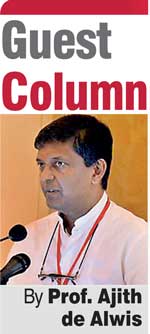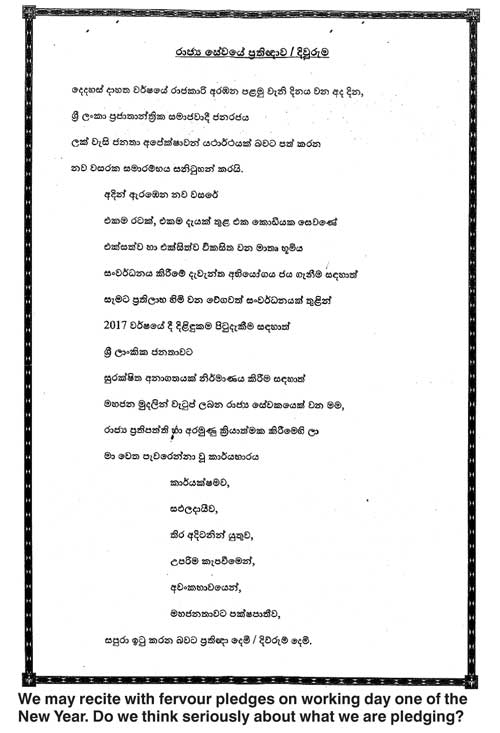Tuesday Feb 17, 2026
Tuesday Feb 17, 2026
Thursday, 5 January 2017 00:00 - - {{hitsCtrl.values.hits}}
Dubai hosts one of the most expensive New Year’s Eve displays. Fireworks are launched from the Burj Khalifa,
the world’s tallest building
December 31st and January 1st are just two days in any calendar. However we make so much effort plus a significant investment of time on celebrating on these two days that one sees the truth of the statement that at times today’s man lives for the day.
In some situations such as dressing up monuments for that final flare up at midnight on 31st you may spend six months in advance planning and executing and on the day at the time it almost takes no time to burn and finish those pyrophoric materials. However, the image – a few minutes of spectacular display – will be there for posterity and the emissions would contribute to – as had been clearly shown in Delhi with the Deevali festival – some negative respiratory impact which almost all ignore.
Thus there is significant cost and resource loss we endure celebrating a year’s departure and another’s arrival. The question is why and do we really think deeply – the relevance, the intentions, expectations, etc., of this type of events?
365 days or 31,536,000 seconds later from the last January 1st after a similar oozing of emotions and well-wishing and some cases solemn pledges to uphold the constitution, fight for injustice, punctuality, productivity as an uppermost objective and host of other well-meaning elements, the next day will come as any other and the situation gets back to normal as had been there before this flurry of activity.
Outliers may not be welcome as it is not the in-thing to observe and comment on the wastefulness. Contrarian views will not be aired nor entertained and all are united towards a glory year that is going to be. However, we forget that it will be our thinking, creative execution and combined sweat that would finally determine whether one can claim of a year well spent or not.
It is simply wishful thinking to believe that one could wish one’s way to success or growth. That is why the work ethos from the second day onwards is more important than the immaculately-clad first day!
What to do?
A friend of mine, Social Researcher Hashitha recently told me of an interesting story of an international security expert – Peter Cross – with wide experience including in Sri Lanka. Peter has gone to a TESCO supermarket in UK and upon finding that there were no eggs on shelf had queried from a shop assistant. He has answered, “Today is Christmas, no eggs and what to do?” Hearing the response he has asked the store assistant whether he was from Sri Lanka and sure enough the answer had been in the affirmative.
As per Peter he has heard this phrase “What to do?” only in Sri Lanka and he attributed this as a unique expression in Sri Lanka when responding to a situation or a question. He identified this response with or without shrugged shoulders and or with outstretched hands with the palm upwards to be uniquely Sri Lankan and the reason for asking from a person with obviously an Asian look directly ‘Are you from Sri Lanka?’ had come with that inner perception. I leave it to the reader to test this social behavioural factor.
Tourist literature only identifies how the Sri Lankan will say ‘Yes’ and not to be mistaken it for a ‘No’! It is evident that we do say this type of sentence ‘api mokada ithin karanne’ in Sinhala as well as perhaps a direct translation of it which is what ‘What to do?’ is, quite frequently when faced with situations. 
This is a statement in resignation and perhaps also transmitting an acceptance of defeat and indicating a no fighting back mindset – a mind in a body which has no answer or solution to the situation. Are we to understand that we give up too easily and really have no strong sense of purpose in life other than a high dependency mindset?
The latter gets manifest in different ways. We prefer reaching out for advice, assistance, analysis to outside for any developing situation with trust and tenacity. There is no serious interest in breaking through from within. We are quite happy to route all our situations to be managed via the external resources department!
The most significant development as a result of such practices getting entrenched within our system is realising no internal development and capabilities. To become strong and resilient requires a change in attitude and a statement of ‘what to do’ with that corresponding tonality must be countered as a national response. Negative signature tunes with vacuous stares cannot do any good and should be an improvement we should bring in this January. So reader beware we do have an attitudinal rolling up to attend to while I hope someone will really corroborate the ‘what to do’ uniqueness.
Importance of thinking
We may recite with fervour pledges on working day one of the New Year. Do we think seriously about what we are pledging? I was thinking about what I am saying this Monday standing with the crowd. Where do we actually stand in terms of productivity, punctuality, attentiveness, determination, honesty, commitment which was the areas that we were solemnly promising to stand up to and to deliver?
I believe that the whole of the Government workforce must have recited the Government Service Pledge on 2 January. Do we think about what would be the benefit if all of us consciously and with understanding improve on all these factors knowing that there is so much desired in terms of improvement?
Thinking and being conscious of what one is doing thus is quite important. One may even extrapolate to suggest that the quality of our national future depends on our thinking. Wrong direction and misdirected thinking naturally should not result in moving forward – neither you nor the nation. Do we really engage in thinking with doing?
This question is applying nationally the comment which has come from Edward de Bono’s assertion that human race has never really learnt to think. A quite serious statement indeed from the person who is considered as the Father of Thinking, who is also the world’s first Professor on Thinking at University of Pretoria, South Africa.
Usually by acting before much thinking we have contributed by way of outputs of many a little or big decisions to feed as negative grist to the media mill. The media with its insatiable appetite to the negative has been only too happy to publicise consequences of our actions without thought. De Bono is quite clear – thinking is not just about philosophical reflections and analysis. Thinking is about getting things done, making things happen and making progress.
Lessons for 2017
If one area that needs improvement in 2017 is that we need to think more about the national economy and environment than political party interests. This fatal attraction to political party lines perhaps has brought in much destruction to the country both to the economy and the psyche. Too many changes are on their way and we as a nation are much less resilient.
We do have many options and opportunities are available. The emerging science and technology areas can serve us very well if we become early adopters. As an ageing society understanding the trends should be with the future in mind. We do have to design our future and this is applicable to 2017.
From 2016 we can only take up lessons by some reasoning out of what we did or did not do. Simply celebrations with lots of empty rhetoric will serve little or no purpose. We usually do not have a quantitative grasp of what we have achieved or missed out and thus designing the future is made much more difficult.
In 1973 at the end of a Geneva peace conference Abba Eban made a now famous remark – the Arabs never miss an opportunity to miss an opportunity. This particular distinction had been later fitted to ourselves by Prof. Razeen Sally – Sri Lankans never miss an opportunity to miss an opportunity. Looking back and around what Prof Sally has mentioned has some truth but this cannot be attributed only to any particular ruling class or party. The guilt has to be shared by all of us who elicit statements such as “What to do?” now being considered as a common attribute of the whole population.
When we prioritise painting zebra crossings with white instead of yellow as it is today, we do send a message about the way we think and act. Missing another opportunity, which basically a year again represents, should not happen. You should not face the incoming year and intone “What to Do!?” With some quality thinking, decision making and execution, let us work towards ensuring that the tales from Serendib will be different in the year 2017.